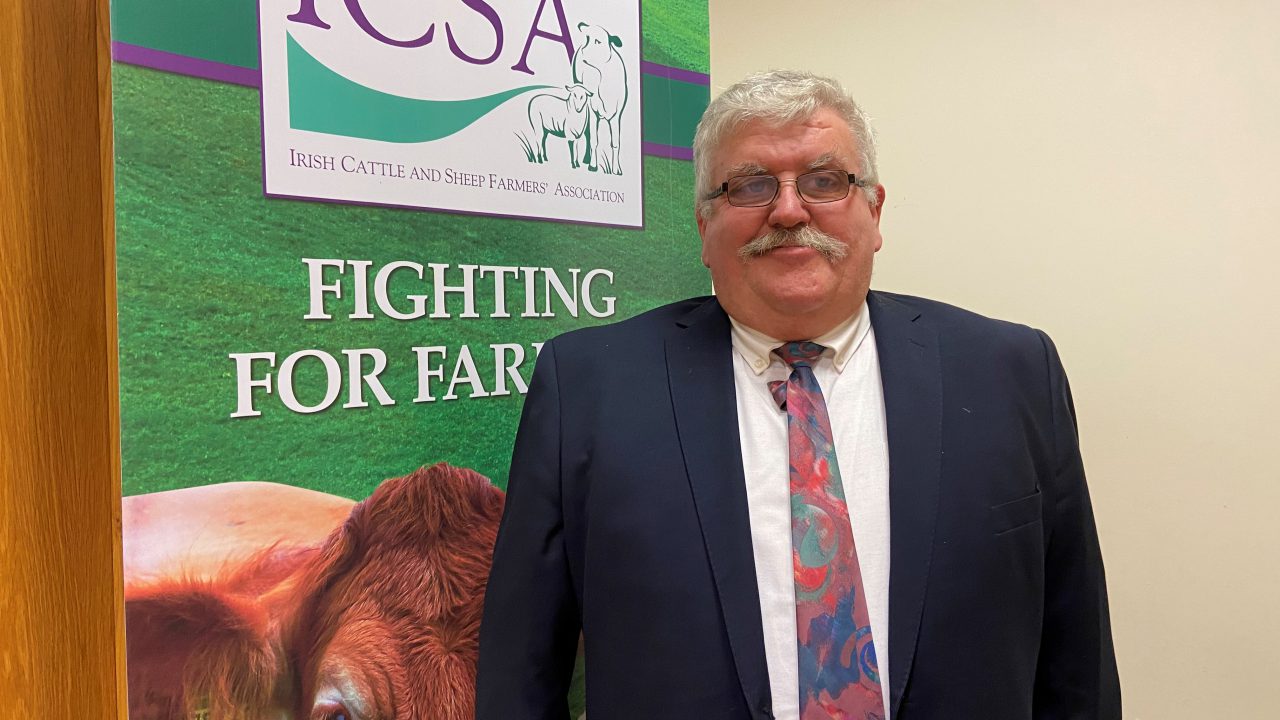The new president of the Irish Cattle and Sheep Farmers’ Association (ICSA) has called for solutions for farmers enduring their “fifth year of economic turmoil” because of Brexit.
Speaking at the virtual ICSA AGM and Annual Conference today (Thursday, January 28), Dermot Kelleher outlined to Minister for Agriculture Charlie McConalogue the supports that farmers need to see in the near future.
Drive on campaign for suckler beef brand
Kelleher told the minister that he must “drive on the campaign to develop a suckler beef brand”.
“There must be absolute commitment from all stakeholders to turn this dream to reality,” he said.
“The first steps have been taken at the Beef Taskforce, with the commitment of funds to Bord Bia for initial market research and development.
“But, on its own, this will not be enough. I don’t want to see us falling at the first hurdle. Developing a suckler brand will require trial and error. It will need absolute commitment from Bord Bia and 100% support from the minister and the department.
It will also need full buy-in from meat factories and, to concentrate minds, I am calling on the minister to attach conditionality to the €100 million Brexit fund secured for processors.
“I believe that there are two essential conditions that should apply to beef processors getting some of this money.
“The first is absolute commitment to price transparency and co-operation with the food ombudsman. The second is that meat processors who are committing their own resources to the suckler brand should get priority for the funding.
“This fund is explicitly for the processing and marketing initiatives of processors and we believe that it must be used to develop suckler beef as a premium brand with a view to returning a strong premium to suckler beef producers.”
BEAM
The ICSA leader called on the minister to find a solution to the Beef Exceptional Aid Measure (BEAM) scheme difficulty.
We cannot have a scenario where thousands of farmers are forced to return badly-needed money due to missing the unworkable 5% reduction.
“ICSA has already proposed that alternatives such as trailing shoe and protected urea be used as an alternative for those who don’t meet the 5%. This is actually a more true and genuine way to reduce carbon rather than selling cattle to other farmers which doesn’t achieve anything. An extension to the end of the year is not the solution, it is simply kicking the can down the road.”
He added that a significant portion of the €1.05 billion Brexit Adjustment Reserve should be delivered to the drystock sector.
“Cattle and sheep farmers are enduring their fifth year of economic turmoil because of Brexit,” he said.
“Uncertain market conditions remain, and the impact of that market uncertainty continues to hit hardest in the lower income farming sectors.”
Kelleher also said that the ICSA wants a CAP that “prioritises low-income cattle, sheep and tillage farmers”.
The eco-scheme must be simple, and it should favour less intensive farmers. The eco-scheme should not set a bar too high to prevent a substantial payment under a new REPS-type scheme in Pillar 2.
“ICSA believes that a trebling of the current GLAS budget is the only realistic way to approach a new agri-environment REPS-type scheme.
“Farmers must be given the means to deliver on ambitious targets and rewarded for their contribution.”
Beef Taskforce
Kelleher is urging the minister to “inject a new sense of urgency into the Beef Taskforce”.
“Progress has been too slow, and farmers want to see results. The Food Ombudsman is a welcome development, but we want to see the necessary legislation put in place that will give the position real powers.
ICSA also wants to see greater price transparency around sheep meat. Sheep farmers are not getting a fair share of the end value of their produce, and this is just as much of a problem as it is in the beef sector.
“We want to see a bigger and better Sheep Welfare Scheme that would significantly increase the financial reward to sheep farmers.
“ICSA is proposing that a per ewe payment of €30/head is now essential. We also want to see the minister and department work with ICSA to devise a plan to make wool valuable again.”
